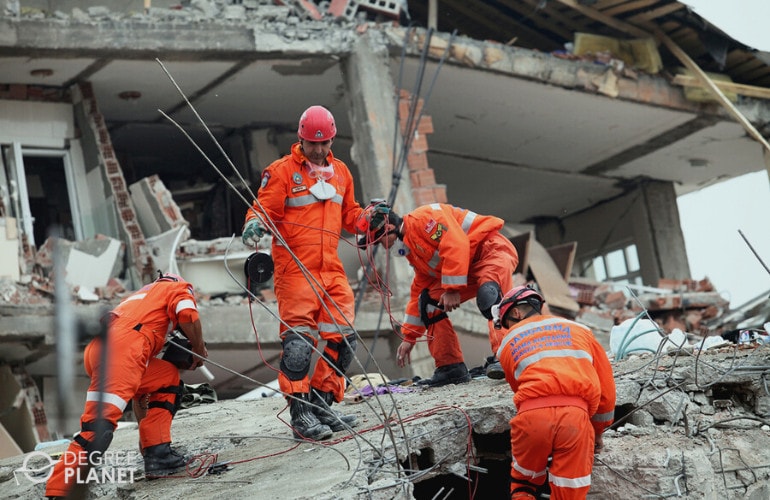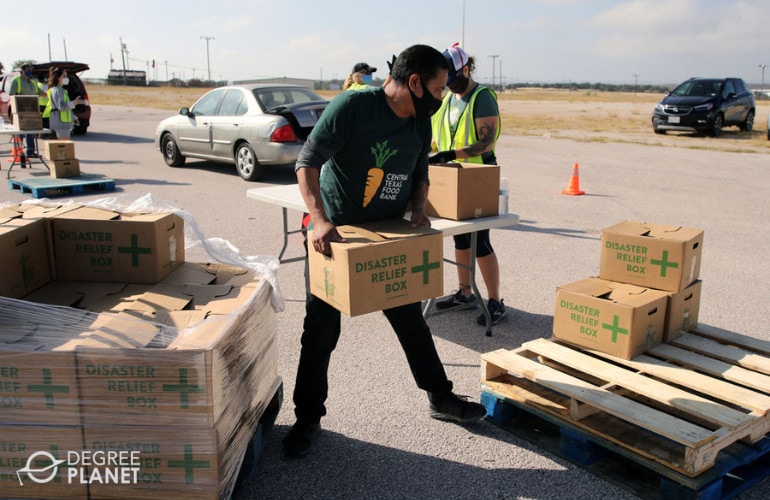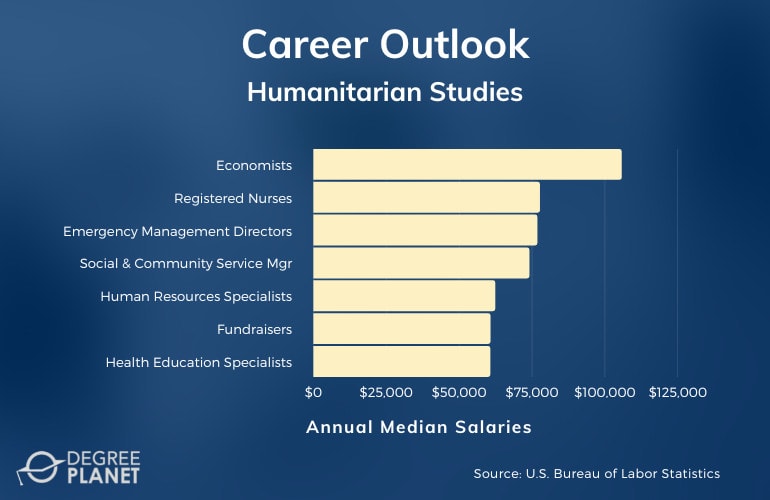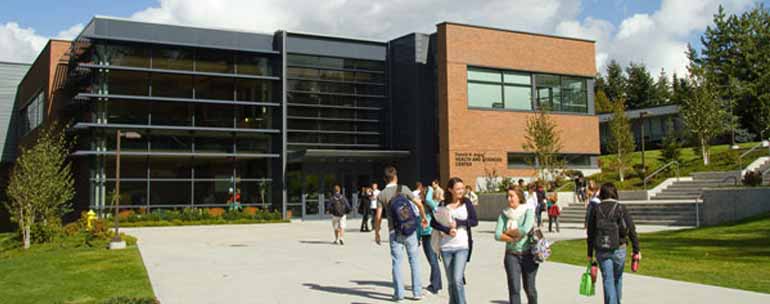If you have a passion for human welfare, a humanitarian degree can help you work toward a fulfilling career that makes it possible to serve communities in need.

Humanitarian action is not limited to a specific skill set. Depending on your interests, you may want to help develop and implement laws, provide medical care, or engage in disaster recovery.
Editorial Listing ShortCode:
A humanitarian bachelor’s degree may help propel you toward a rewarding role working with global nonprofits, government agencies, and humanitarian organizations.
Online Humanitarian Degrees

There are many online philanthropy and humanitarian degree options that can help you work toward a career as a humanitarian aid worker. The best degree program for you depends on your specific interests and goals.
Select the program that most interests you to jump to that section of the guide:
- Bachelor of Disaster and Emergency Management
- Bachelor of Economics
- Bachelor of Human Services
- Bachelor of Humanitarian Aid and Development
- Bachelor of Humanitarian Studies
- Bachelor of International Relations
- Bachelor of Nursing (BSN)
- Bachelor of Political Science
- Bachelor of Social Work
- Bachelor of Sociology
Regardless of the specialty you select, you will still receive a strong foundation in humanitarian studies and related courses.
Disaster and Emergency Management

A degree in disaster and emergency management focuses on the communication and coordination skills that are necessary to respond to a disaster.
You can learn about the response practices for events like hurricanes, terrorist attacks, and public health crises. While completing a degree in disaster and emergency management, you’ll likely take courses in disaster response and recovery, emergency planning, and applied emergency management.
Editorial Listing ShortCode:
This degree can offer preparation for a wide range of humanitarian careers. Graduates often pursue work as fundraisers, emergency services managers, safety specialists, and environmental health and safety officers. These positions provide opportunities to serve the public and promote human welfare.
Economics

If you are interested in pursuing humanitarianism by building a stronger and more equitable economic structure, a degree in economics could be a strategic choice.
During an economics degree program, you’ll study the production, distribution, and consumption of goods and services. Many online economics degrees include coursework in international economics, labor economics, and econometrics. Economics programs also typically have a heavy emphasis on math skills, including higher-level math like calculus.
Editorial Listing ShortCode:
Graduating with an economics degree can help you become better qualified to seek management and administration positions with nonprofits. Some professionals also work as economic experts for humanitarian organizations.
Human Services

On-campus and online human services degree programs are often a fit for humanitarian careers because they focus on the analytical and practical skills that are necessary to work in a nonprofit organization. More specifically, in these programs you can learn about project management, leadership, and collaboration.
Human services graduates may go on to become a community outreach specialists, child adoption specialists, policy analysts, or child welfare specialists. People in these positions work directly with diverse communities and offer support to those in need.
Editorial Listing ShortCode:
Many degree programs in human services include courses in ethics, social and cultural diversity, community engagement, nonprofit administration, and sustainable funding.
Humanitarian Aid and Development

Students who complete a bachelors in humanitarian aid and development often go on to careers in policy development, disaster relief work, community risk assessment, and aid development programming.
The degree centers on the knowledge and practical experience that can help you offer support during a humanitarian crisis. The course topics you might cover during a humanitarian aid and development program include ethics, psychology, and geography.
Editorial Listing ShortCode:
Some of the more specific course offerings for these degree programs cover human rights, social research, investigating and communicating social problems, and cultural diversity. In order to graduate, you may also complete a practicum or internship to demonstrate that you fully understand the principles of humanitarian assistance.
Humanitarian Studies

A bachelors degree in humanitarian studies can help you better understand issues like poverty, disease, and violations of human rights.
Once they’ve completed the program, graduates should be able to respond to and manage these kinds of crises. Job candidates with humanitarian studies degrees are appealing to international NGOs (non-governmental organizations), global health initiatives, and human rights organizations. This is because humanitarian majors have extensive training in responding to disasters and injustice.
Editorial Listing ShortCode:
During a humanitarian studies program, you might complete courses in international communication, politics, the philosophy of human rights, and gender issues.
International Relations

If you are interested in humanitarian work on a global scale, you may want to consider a degree in international relations.
With this major, you can learn how relationships between countries are affected by factors like economics, politics, and war. The curriculum for an international relations bachelors degree typically includes course topics like international politics, global governance, the causes of war, and foreign policy. This coursework can help hone your critical thinking and analytical skills.
Editorial Listing ShortCode:
Many students who graduate with a degree in international relations go on to work as political consultants, interpreters or translators, international policy analysts, and nonprofit program coordinators.
Nursing

Nursing is inherently focused on treating the sick and caring for those in need, which makes it a strong degree prospect for humanitarian work. Humanitarian NGOs often seek out skilled and highly trained nurses who can respond quickly to a crisis.
Editorial Listing ShortCode:
When completing a nursing degree, you will most likely take courses like microbiology, psychology, physiology, and anatomy. Humanitarian nurses sometimes travel around the world, so there may also be coursework in global health, foreign languages, and cultural diversity. Nurses with humanitarian interests sometimes pursue positions with the United Nations, the Red Cross, and Doctors Without Borders.
Political Science

If your passion for humanitarianism lies in the realm of government and public policy, you might consider a bachelors degree in political science. This degree program focuses on national and global political institutions, public affairs, and political science theories.
Editorial Listing ShortCode:
A political science degree often involves coursework in cultural diversity, political ideologies, global politics, environmental politics, and international relations. Graduates are often better prepared to take on roles as policy analysts, human rights officers, legislators, or political consultants. Political science professionals may have a direct influence on critical humanitarian causes.
Social Work

Social work and humanitarian work go hand in hand because they both prioritize the well-being of every person. Talented social workers are highly sought after for humanitarian roles.
During the process of completing your bachelor’s degree in social work, you can expect to take courses in social welfare policy, ethics, human behavior, and diversity. Many programs also require a practicum to demonstrate that you can implement what you have learned. After graduating, you may look for jobs at hospitals, schools, government agencies, and humanitarian NGOs.
Editorial Listing ShortCode:
Some social work positions specialize in working with specific populations, like people with disabilities, children, or people who lack access to necessities such as food and housing.
Sociology

A bachelor’s degree in sociology can help prepare you for a number of careers, and it is well-suited to those who have an interest in humanitarian work.
Sociologists study human behavior and interactions between social groups. Sociology programs often require courses in global social processes, political science, diversity, and family dynamics. Much of the curriculum is often focused on case studies and practical applications of theoretical concepts.
Editorial Listing ShortCode:
Completing a sociology degree can help prepare you for a position in criminal justice, social services, urban planning, community health, or social research. Sociology majors often develop critical thinking, problem-solving, and communication skills that are vital to humanitarian work.
Critical Soft Skills for Humanitarian Professionals
Humanitarian work involves rapidly changing circumstances and often stressful work conditions, so certain skills are essential to this field.
When operating under crisis or disaster conditions, people in humanitarian roles are tasked with managing and administering potentially life-saving measures. This requires a variety of skills and abilities. Some of the most valuable soft skills for humanitarian professionals are listed here:
- Critical thinking. Humanitarian work involves examining and deeply analyzing complex issues before implementing changes or solutions. People in humanitarian roles determine what questions to ask to find what is driving a particular problem.
- Communication. Humanitarian workers communicate with people from many different backgrounds. They are often responsible for expressing vital and sensitive information during a crisis.
- Leadership. Many humanitarian roles involve leading teams of crisis responders, so maintaining a calm and even-handed presence is crucial. It is also essential to know how to foster collaboration among the members of a team.
- Problem solving. In addition to analyzing problems, humanitarian workers have to develop effective and practical solutions. They are often working under tight budgets and timelines and respond accordingly.
- Adaptability. Disasters and crises are often unstable and fast-moving, so workers are flexible enough to effectively manage any sudden or unexpected developments. Mental agility is often a core component of humanitarian jobs.
Although there are other skills involved in humanitarian work, these soft skills are essential. They act as the foundation of many of the decisions, policies, and practices that could have a significant effect on people in need of help.
Humanitarian Studies Careers & Salaries

A degree in philanthropy and humanitarian studies is useful for many careers, including those in the government and private sector.
According to the Bureau of Labor Statistics, humanitarian positions can be found in multiple industries with a wide range of salaries, many of which are above the national average.
| Careers | Annual Median Salaries |
| Economists | $105,630 |
| Registered Nurses | $77,600 |
| Emergency Management Directors | $76,730 |
| Social and Community Service Managers | $74,000 |
| Human Resources Specialists | $62,290 |
| Fundraisers | $60,660 |
| Health Education Specialists | $60,600 |
| Social Workers | $50,390 |
| Social Science Research Assistants | $49,720 |
| Interpreters and Translators | $49,110 |
Positions with a focus on human service—such as social work, emergency management, and fundraising—are often a logical progression from a humanitarian studies degree. The positions you can qualify for will depend on a number of factors, though, such as your chosen major.
Editorial Listing ShortCode:
The Bureau of Labor Statistics also shows that many of these positions have positive job outlooks over the next ten years. This includes economists (13%), registered nurses (9%), and social workers (12%).
Admissions Requirements

There are many variations in the admissions requirements for bachelor’s programs in humanitarian studies. Here are some of the most common criteria:
- ACT or SAT scores. This requirement is no longer as common, but some schools still request standardized test scores.
- Transcripts. Your transcripts show all of your completed coursework in high school and in any prior college classes.
- Letters of recommendation. Letters are often written by previous instructors or employers.
- Personal essay. In a personal essay, you can reflect on your goals and interest in humanitarian work.
In addition to these requirements, schools may also require you to complete an application and pay a processing fee.
Bachelor’s in Humanitarian Degree Programs Accreditation

When researching bachelors in humanitarian degree programs, it’s helpful to keep in mind that not every program comes from a reputable school. Regional accreditation is a mark of a credibility for colleges and universities.
Regionally accredited schools go through a rigorous assessment by accrediting organizations to ensure that they offer an exemplary standard of academic quality. In addition, courses taken at an accredited institution are more likely to transfer if you should ever decide to change schools.
Financial Aid and Scholarships

Bachelors degree programs can be costly, but there are financial aid options available for students who qualify. One of the most common options is federal aid. You can fill out the Free Application for Federal Student Aid (FAFSA) to see if you’re eligible. You may also be able to find other forms of aid through your state government.
In addition, if you are already working in a position related to humanitarian work, you can check with your employer to see if they offer tuition assistance. You can also search for scholarships that are specifically targeted at students pursuing humanitarian degrees.
What Is a Humanitarian Degree?
A humanitarian degree is intended to help you develop specialized skills and knowledge so that you can provide aid to people in need all over the world. You can learn about the hazards, disasters, and injustices that people face as well as how to aid in resolving global issues.
Depending on the specific bachelor’s degree program you choose, you may focus on different problems or populations. For example, your studies may center around health, food scarcity and nutrition, poverty, human rights, war, natural disasters, terrorism, or gender studies.
What Can You Do with a Humanitarian Degree?

Obtaining a humanitarian degree may help you qualify for a number of positions in various industries. Some graduates work at nonprofits, including management and administration.
Depending on your major, you may become better prepared to work in law, science, economics, or disaster response related to humanitarian crises. Because the need for humanitarian work never ends, there are generally many career opportunities for students with humanitarian degrees.
Editorial Listing ShortCode:
Common careers in the humanitarian field include emergency management directors, registered nurses, fundraisers, social workers, policy analysts, and health officers. There’s no limit to what you can do with a human services degree.
How Long Does It Take to Get a Bachelors in Humanitarian Studies Online?
The length of time that is required for you to complete a bachelor’s degree in humanitarian studies depends on several factors, including whether you attend full-time or part-time.
If you follow a traditional 16 week semester and attend full-time, you can generally complete a bachelors degree in 4 years. If you attend year-round and follow an 8 week semester, you can often shorten your completion time considerably. Students who attend school part-time will likely take longer to complete a humanitarian bachelor’s degree program.
Is a Bachelor’s in Humanitarian Studies Degree Worth It?

Yes, a bachelor’s in humanitarian studies degree is worth it for many students. Humanitarian work is needed globally and in many different areas. This means that there is a steady demand for workers who are properly trained and educated.
Many humanitarian positions—such as economists, interpreters and translators, and fundraisers—are expected to grow much faster than the average for all occupations. Overall, the Bureau of Labor Statistics projects 12% job growth for community and social service occupations over the next ten years.
Editorial Listing ShortCode:
You might consider a humanitarian studies degree if you have a passion for helping others and want to build a career that allows you to serve struggling communities both locally and around the world. After earning a bachelors degree, a number of graduates continue on to earn a masters in humanitarian aid online or on campus.
Universities Offering Online Bachelors in Humanitarian Studies Degree Program
Methodology: The following school list is in alphabetical order. To be included, a college or university must be regionally accredited and offer degree programs online or in a hybrid format.

Arizona State University offers an online program for a BA in Political Science. It requires the completion of 120 credit hours and is made up of 39 classes. Each class is 7 ½ weeks long. Diplomas do not specify that the degree was earned online. Students can choose an accelerated format and potentially earn their BA and masters in 5 years.
Arizona State University is accredited by the Higher Learning Commission.

Students can earn a BS in Human Services at Lesley University. Earning a human services degree can help students make an impact in their communities. The program is online and can be completed with a full-time or a part-time schedule. It requires the completion of 120 credit hours and two internships where students can gain real-world experience.
Lesley University is accredited by the New England Commission of Higher Education.

Liberty University offers a BS in Human Services. The degree requires the completion of 120 credit hours and usually takes around 3 ½ years to complete. Each course is 8 weeks long, and the degree can be completed entirely online. Students are also given the opportunity to gain field experience through an internship. Coursework focuses on ethics, foundations, and practical instruction.
Liberty University is accredited by the Southern Association of Colleges and Schools Commission on Colleges.

Northwest University’s BA in Humanitarian Leadership program is designed for students who want to do humanitarian work both at home and abroad. The program incorporates faith as a major component. The program requires the completion of 120 semester credits. It includes classes like Theology of Compassion and Intercultural Communication. To graduate, students must also complete a practicum.
Northwest University is accredited by the Northwest Commission on Colleges and Universities.

Old Dominion University offers an online program for a BS in Human Services. Students can opt for the degree completion track or the full program track. The full program requires the completion of 120 credit hours. Degree completion is for students who already have some credits and can get at least 30 credits with ODU. To graduate, students must complete a supervised internship during their final semester.
Old Dominion University is accredited by the Southern Association of Colleges and Schools Commission on Colleges.

Purdue University’s online BS in Human Services program requires the completion of 180 credits (120 semester credits). Each course is 10 weeks long. Students typically need to devote 15 to 18 hours per week to their coursework and can usually complete the program in 4 years. The program offers multiple start dates. Students who complete the program qualify to sit for the Human Services—Board Certified Practitioner exam.
Purdue University is accredited by the Higher Learning Commission of the North Central Association of Colleges and Schools.

Southern New Hampshire University offers an online Bachelor of Arts in Human Services program that requires the completion of 120 credits. There are 3 concentrations to choose from: Child and Family Services, Gerontology, and Substance Abuse. Application fees and ACT and SAT scores are not needed to apply. Accepted students may transfer in up to 90 qualifying credits.
Southern New Hampshire University is accredited by the New England Commission of Higher Education.

The University of Arizona offers an online program for a BAS in Human Services. It requires the completion of 120 credit hours. Accepted students may transfer in up to 60 qualifying credit hours from other institutions. The program offers a mix of classroom and in-the-field training. It also requires an internship where students get to work with local agencies and begin making a difference in their communities.
The University of Arizona is accredited by the Higher Learning Commission.

The University of Cincinnati’s Bachelor of Social Work program requires the completion of 57 credit hours. Accepted students who attended a school that has an articulation agreement with UC may transfer in qualifying credits.
The curriculum seeks to train students in all fields of social work, including substance abuse, poverty, and foster care. In addition to online coursework, students are given opportunities to gain hands-on experience in their communities.
UC is accredited by the Higher Learning Commission.

Walden University offers an online program for a BS in Human Services. Students can choose between six concentrations, including a self-designed program. Required credit hours varies based on the concentration chosen. Students can transfer in up to 135 qualifying credits. The program offers a field work practicum, but it isn’t required for program completion.
Walden is accredited by the Higher Learning Commission.
Getting Your Bachelor in Humanitarian Studies Degree Online

A bachelor’s in humanitarian studies degree may be a good fit if you are invested in protecting human rights and welfare.
Humanitarian jobs are found in a wide range of industries—including politics, economics, and medicine—so you can choose an option that suits your interests. Graduating with this degree may help you qualify for jobs that focus on building policies, providing aid, and creating preparedness plans that help protect people on a global scale.
If this kind of work is the path that you want to pursue, you can begin your educational journey by researching accredited universities that offer online humanitarian bachelor’s degree programs.

